Kizuna Solutions:
Good Practice with Japanese Companies
2025.8
From SIDS Decarbonization Forum (2025)ⅰ
Toshiba in Vanuatu, Papua New Guinea
- Providing Electricity Access in Remote Area -
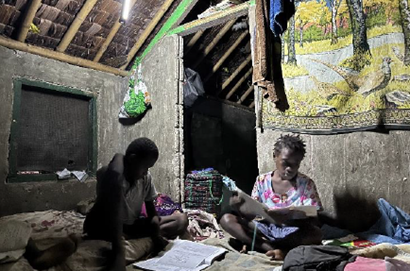
| Event | Small Island Developing States (SIDS) Decarbonization Forum (Held in March 2025) |
|---|---|
| Presenter | Mr. SUZUKI Masao Project Manager, Delighting Everyone Project Team New Business Development Office, Next Business Development Div. Toshiba Corporation |
| Summary | Distributed renewable energy services for remote islands and remote areas in Pacific Island countries by Toshiba Corporation |
| Reference |
We are working on distributed power supply services using renewable energy in Pacific regions where electrification is difficult. Today, I would like to introduce our efforts in this area.
I would like to start with the typical issues with Island countries that Toshiba focused on.
First, the population is widely dispersed, and it is difficult to economically install and maintain infrastructure, especially in remote areas.
Second, although energy support programs for remote areas were implemented, they were mainly focused on providing funding and equipment. There remain issues with sustainable operation and maintenance systems.
Third, energy demand is not quantitatively visible, making it difficult to decide on the optimal investment.
Toshiba will resolve these issues with our services, together with the rural community.
Collaboration with Small Store Owners in Remote Areas
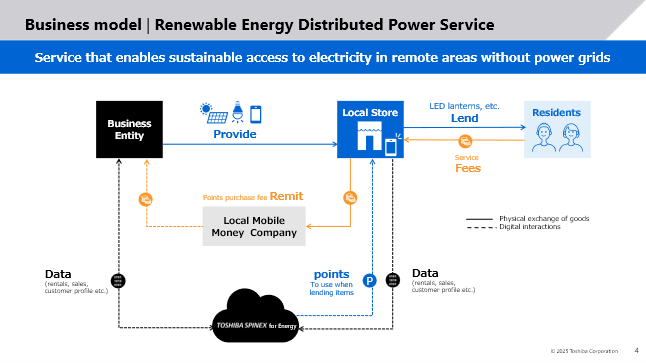 |
|---|
Business Model (P4 of Original Presentation) |
This service enables sustainable access to electricity in remote areas without power grids, as we provide the necessary equipment to charge, and electrical items to small store owners.
As the first step, we install solar power generators and a large number of rechargeable LED lanterns, portable batteries, etc. in the stores in remote area villages.
As the second step, such store owner charges the LED lanterns and related items, and rents them to the residents for a small fee.
The residents use the lights and batteries for a day, and return them to the store owner on the following day. The store owner recharges them.
The key to this business is the 'payment system'. The electrical items have a lock function to prevent them from being used. When a resident comes to borrow an item, the store owner uses our application to unlock it for one day, charging the resident a small rental fee. To unlock, the store owner needs to purchase Business Entity Points from the service operating company through Local Mobile Money Company.
The service operating company is responsible to manage, repair, and replace generators and lanterns loaned to the village. By relying on the service operating company in management and operation of these services, residents can use electricity safely and stably at a low cost without worrying about breakdowns.
Providing Sustainable Service
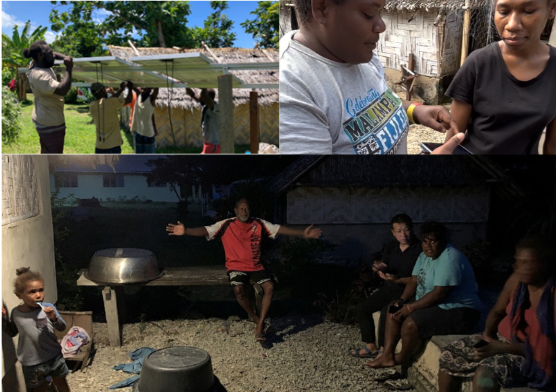 |
|---|
Features of Service (P5 of Original Presentation) |
The features of our service are as follows:
1.The service can be implemented even in areas with a dispersed population.
No extension of power lines is necessary. Continuous operation is possible solely with revenue from residents, without any burden on the national treasury.
2.The service has a low environmental impact.
Thanks to the nature of the sharing service, we can reduce the amount of equipment. Also, the service operating company maintains and replaces the equipment, so the broken equipment is not left in remote areas.
3.The speed of deployment is remarkable.
It only takes a few days to reach an agreement with the village, install the service, and train store owners.
4.The service can contribute to employment and the local economy.
The service creates new income sources for store owners, increases residents' productivity, and hires local people.
While this is yet a transitional technology until full electrification, it can surely help visualize the need for electrification, and contribute to the construction of optimal social infrastructure.
Excellent Reputation in Vanuatu and PNG
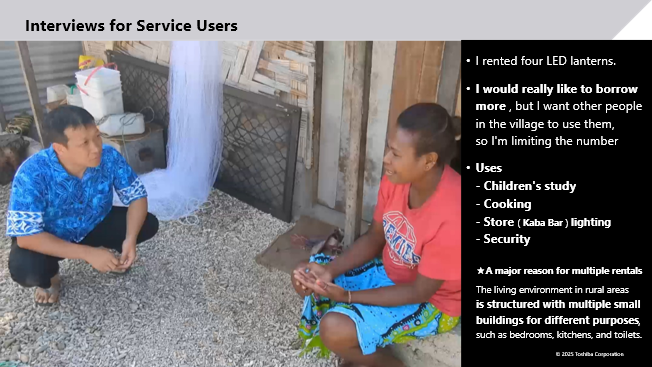 |
|---|
Interview to Users in Vanuatu (P7 of Original Presentation) |
More than two years have passed since the start of trial in Vanuatu, and about 600 LED lanterns are being rented out every month in a village with about 120 people. According to the user interview, one of the users explained that the lights are used for children’s study, cooking, lighting the Kava-bar (her family’s store), and home security. We also hear from many other residents that our services are helpful in their lives.
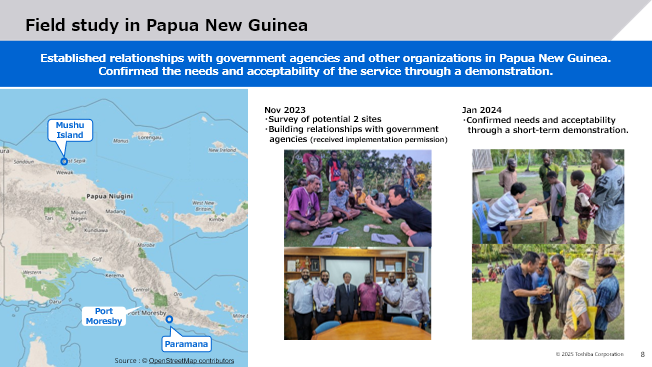 |
|---|
Field Study in Papua New Guinea (P8 of Original Presentation) |
We also conducted a demonstration in Papua New Guinea. With the support of the PNG Investment Promotion Agency, we conducted surveys in Paramana and Mushu Island, and received affirmative feedbacks from the local residents there as well.
Conclusion
As we have completed the feasibility study phase, we are now going to start the business phase. Toshiba plans to establish a new company with the aim of implementing the service. Like this, we are committed to contribution to "access to electricity" and " spread of renewable energy" in Pacific Island countries. If you have the same issues or are interested, please come and work with us together.
|
Speaker Introduction Mr. SUZUKI Masao After joining Toshiba Corporation, Mr. SUZUKI participated in the JICA Volunteer Program from 2002 to 2004, working in Vanuatu. Drawing on this experience, he developed the idea for this project in 2020 and has since been engaged in research, demonstrations, and other activities toward its commercialization. |
|---|
- This document has been prepared based on information deemed reliable by JPRSI. No guarantee is made as to its accuracy or completeness.
- Any profit or loss resulting from actions taken based on this document is the sole responsibility of the party taking such actions, and JPRSI shall not be held liable.
- You are free to link to this document. If you quote or cite any part of this document by other means, please clearly state "JPRSI (Japan Platform for Sustainable Infrastructure) website" as the source.
ⅰ This article is prepared based on the presentation by Toshiba Corporation, with its permission, at
Small Island Developing States (SIDS) Decarbonization Forum (2025)
https://www.env.go.jp/en/press/press_03884.html

